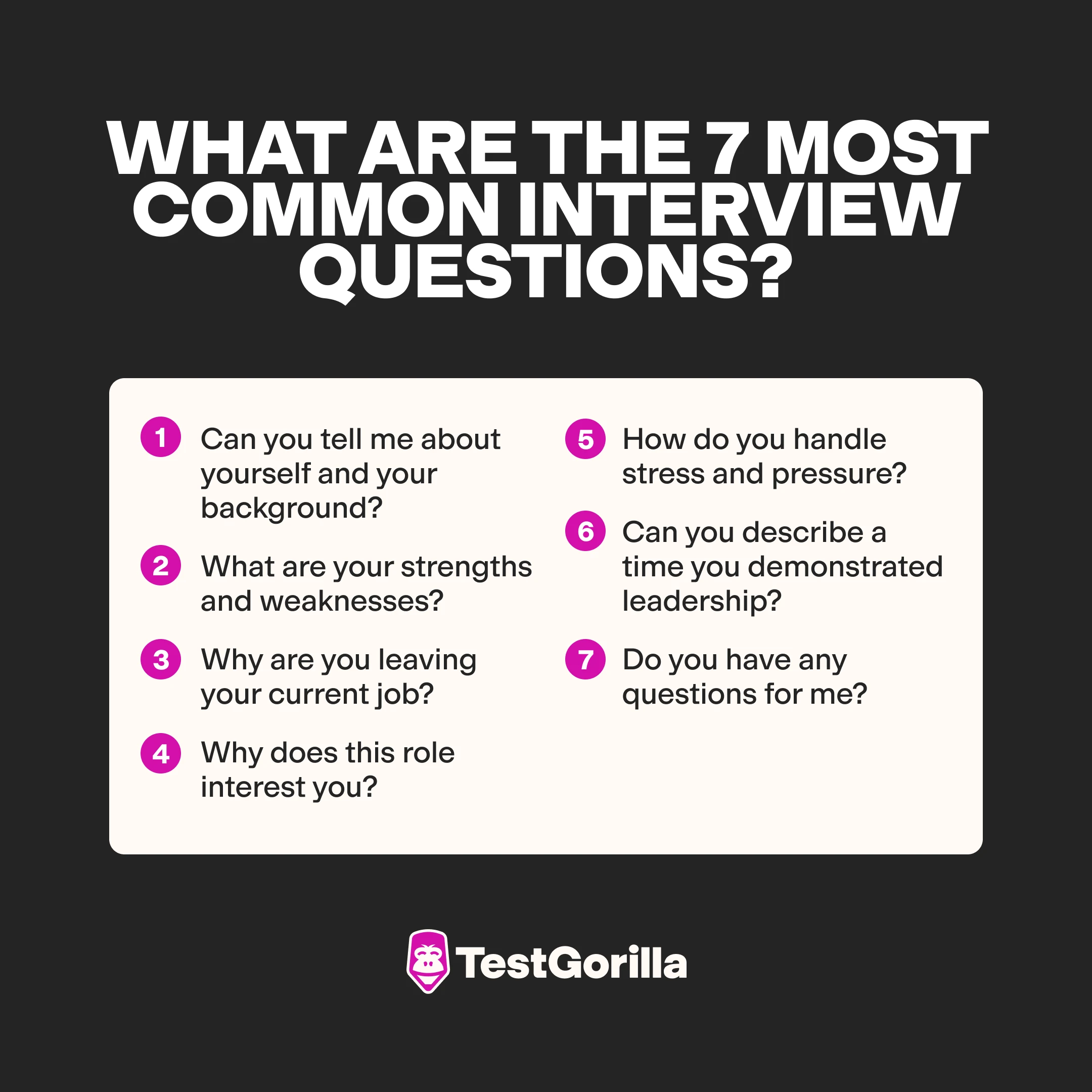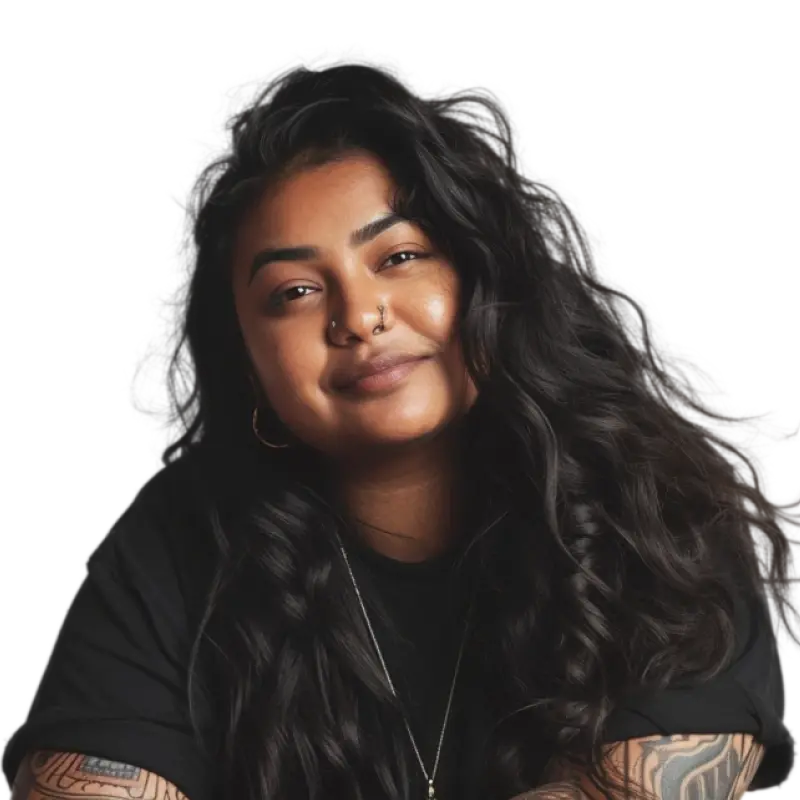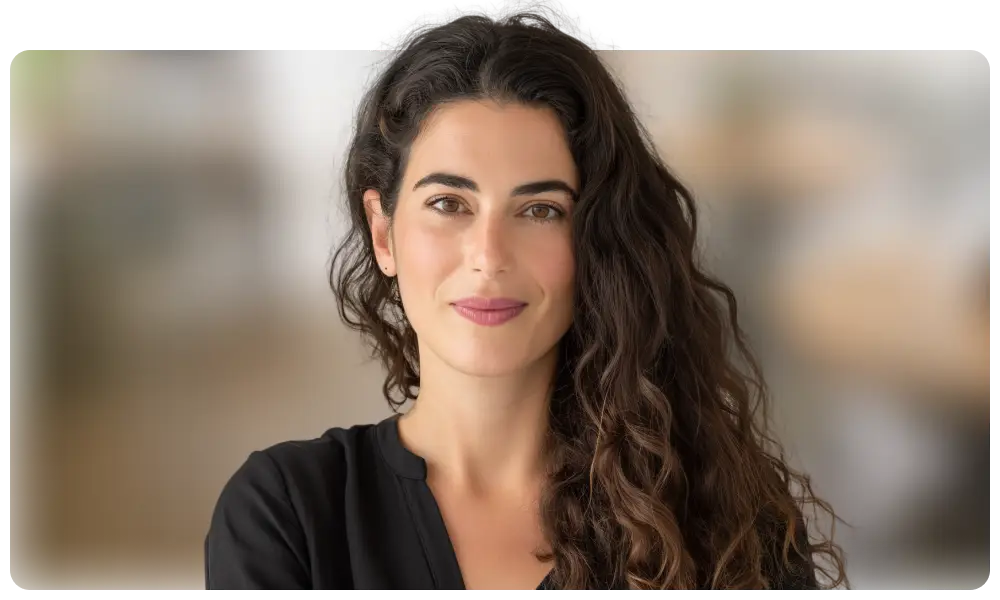What are the 7 most common interview questions and answers?
The interview questions you’re about to read may be familiar to you. Questions about your strengths, experience, and organizational skills aren’t exactly reinventing the interview.
But that doesn’t mean you should wing it when the interviewer asks them. Interviewers use these questions to see if you can communicate well, be truthful about your experience, and tell an engaging story about your background.
Since these questions have stood the test of time, so don’t be vague or make up stories. Skilled interviewers can tell if you’re not being honest or trying to trick them, and that's a quick ticket out the door.
Below, we explore the seven most common interview questions you’re likely to encounter and what employers look for in strong answers. We also give you some examples to help you out.
Table of contents
- 1. Can you tell me about yourself and your background?
- 2. What are your strengths and weaknesses?
- 3. Why are you leaving your current job?
- 4. Why does this role interest you?
- 5. How do you handle stress and pressure?
- 6. Can you describe a time you demonstrated leadership?
- 7. Do you have any questions for me?
- Hook interviews with TestGorilla
1. Can you tell me about yourself and your background?
Storytelling is an important part of the interview process. Interviewers want to get a feel for who you are, how you think, and how you might perform in the role they’re hiring for.
To give a strong “Tell me about yourself” answer, start by sharing an early experience that sparked your interest in the field you’re applying to work in. Next, highlight key achievements or challenges related to the job you’re applying for. If you’re a seasoned pro, talk about your work-related experiences here. Otherwise, talk about experiences in other areas of life, like volunteer work, school projects, or personal hobbies that show your relevant skills. Wrap it up by linking these experiences to how they've prepared you for this role, showing your readiness and how you can add value.
Example:
“Growing up in a bustling city with a diverse population inspired my interest in public health from a young age. Seeing the healthcare challenges in my community led me to volunteer at local clinics and eventually pursue a degree in public health. Since graduation, I’ve been reading lots of books and learning more about nutrition and preventive care, and I’ve become really passionate about making healthcare more accessible.”
Are you a job seeker?
Visit our job seeker hub to get help with your assessment, find your dream job and more.
2. What are your strengths and weaknesses?
Showing your strengths is typically what you can expect on a skills assessment. But interviewers also ask this question to see how well you understand yourself, how openly you can discuss your strengths and weaknesses, and whether you can learn from setbacks.
Honesty and self-awareness are key here. You don’t need to get too personal, but try to reflect on your experiences with specific examples that show off your abilities and growth. Pick a standout accomplishment from your work history that shows your strengths. But remember, your interviewer isn’t looking for a career highlight reel, so keep it brief. If you're new to work, talk about times outside of work where you've faced challenges or used skills that relate to the job you want. The idea? Show you're ready for the job and can bring something valuable to the table.
Example:
“I think my ability to adapt quickly is a strength. For example, when I was a barista, I had to learn new tasks or change roles right on the job – especially during busy periods. I learned to manage changes efficiently and keep the service flowing smoothly.
“However, I sometimes spent too much time perfecting simple tasks, like arranging the cookie display cases. My supervisor helped me get past my perfectionist tendencies by giving me time limits for tasks, and I’ve continued to use this strategy to deal with my perfectionism-related weaknesses.”
3. Why are you leaving your current job?
This question is typically reserved for candidates who are still employed. With this question, employers want to know what you're aiming for in your career and what's motivating you to explore new opportunities. Your answer is a chance for you to show off your professionalism, honesty, and forward-thinking attitude. It’s not a chance for you to badmouth your current boss. When you're answering, keep it positive and steer clear of any negative talk about your current job or coworkers. Instead, highlight what you're excited about – like new growth and challenges.
Example:
“I've enjoyed my time at my current company and have learned a lot, especially through collaborating with cross-functional teams on various projects. However, I've realized that I'm looking for a role with more freedom and ownership over my work. I'm eager to find a position where I can take the lead on projects from start to finish and really see the impact of my efforts.”
4. Why does this role interest you?
When you’re answering this question, it might be tempting to butter up your potential employer with compliments. But overdoing it can make you seem phony or even manipulative to the interviewer. Here’s your chance to show that you’ve genuinely researched the job – and your potential employer – before applying.
They want to know what specifically drew you to their company and position. Be genuine in your response and show that you've done your homework on the company and the role. If it’s all about the money for you, we get it. But your interviewer wants to see you're pumped to be part of the team – and not just to get a nice paycheck or your desired salary.
Mention what jumps out at you in the job description, what feels right about the company culture or mission, and why it gets you stoked for the opportunity. If you're just starting out, that's cool, too! Create a killer response about your eagerness to learn and grow.
Example:
“I've been following your company for some time and have been really impressed by your commitment to innovative solutions and sustainability. This role stood out to me because it aligns with my passion for environmental conservation. Even though I'm just starting out, I'm eager to apply my skills and gain valuable experience while contributing to your environmental initiatives.”
5. How do you handle stress and pressure?
Dealing with work-related stress is par for the course in most jobs. Your interviewer wants to know whether you're someone who can handle pressure gracefully or if you're more likely to buckle under it.
Explain a time when you kept your cool despite a challenging situation. Describe the specific strategies you used to get through the situation.
If staying calm under pressure is something you're working on, talk about that, too. Share the steps you’re taking to keep stress under control.
If you're new to the industry or lucky enough to have a really chill job, then it's okay to mention that. Just focus on how you handle stress in different situations, and try to show you can overcome pressures relevant to the role. Example:
“During an important project, unexpected complications arose that threatened our timeline. Instead of panicking, I gathered the team to assess the situation calmly. We identified alternative solutions, delegated tasks effectively, and maintained clear communication channels to successfully meet our deadline.”
The answer could go deeper:
“While I've generally handled pressure well, I'm always looking for ways to improve. Recently, I've been honing my time-management skills to make sure I prioritize tasks effectively and maintain a healthy work-life balance. For example, I break up bigger projects into smaller tasks and dedicate a specific time of each day to work on each task. Also, I don’t let myself work on weekends.”
6. Can you describe a time you demonstrated leadership?
Employers love to see leadership skills in action. It proves you're someone who can step up, rally the troops, and get things done. So, they'll want to hear about a time when you stepped up and led the way.
Think of a specific situation where you took the reins and made a positive impact. If you’ve ever held a leadership position at work, you can discuss your leadership experiences. If you haven’t held a leadership position, talk about other moments where you stepped up as leader. Maybe it was organizing a community fundraiser or coaching a sports team, for instance.
If you're still working on your leadership game, talk about what you're doing to improve.
Example:
“In my previous role as a graphic designer, we faced a tough situation when our design software crashed right before a big client presentation. I stepped up, gathered the team, and we brainstormed solutions. We switched to backup software, redistributed tasks, and kept communication open.
“Despite the setback, we delivered a great presentation, impressing the client and strengthening our team bond. It showed me the value of proactive leadership in handling unexpected challenges in design."
7. Do you have any questions for me?
This question is almost always asked toward the end of the interview. Don’t treat this like a throw-away or optional one. It lets the interviewer know you're genuinely interested in the position and curious about the organization.
Be sure to have some thoughtful, relevant questions ready to go.
Examples:
“Can you tell me more about the team I'll be working with and their roles within the organization?”
“What are the main goals or priorities for this position in the first six months?”
“How does the company support professional development and growth opportunities for employees?”
“Can you describe the company culture and what it's like to work here on a day-to-day basis?”
“What are the biggest challenges for the team right now, and how does this role help address them?”
Hook interviews with TestGorilla
Now that you know what to expect in interviews, it’s time to start applying for jobs. TestGorilla’s job board offers various remote job listings you can apply for by asking to be invited to complete talent assessments. These assessments are made up of tests from our test library.
With talent assessments, you can show off your skills to employers on objective skills tests without wasting time on cover letters and resumes.
Once a prospective employer invites you to the interview stage, rest assured that TestGorilla’s interview software will help level the playing field for you. We encourage the employers who use our software to follow the structured interview model. This means questions are pre-set and every candidate answers the same ones. It’s a fair game for everyone.
Curious to learn more? Check out our job board today to find the jobs you want, take job assessments to showcase your skills, and get those interview invites.
Related posts
You've scrolled this far
Why not try TestGorilla for free, and see what happens when you put skills first.
Latest posts
The best insights on HR and recruitment, delivered to your inbox.
Biweekly updates. No spam. Unsubscribe any time.

Skills tests to hire the best
Our screening tests identify the best candidates and make your hiring decisions faster, easier, and bias-free.
Free resources
A step-by-step blueprint that will help you maximize the benefits of skills-based hiring from faster time-to-hire to improved employee retention.
With our onboarding email templates, you'll reduce first-day jitters, boost confidence, and create a seamless experience for your new hires.
This handbook provides actionable insights, use cases, data, and tools to help you implement skills-based hiring for optimal success
A comprehensive guide packed with detailed strategies, timelines, and best practices — to help you build a seamless onboarding plan.
This in-depth guide includes tools, metrics, and a step-by-step plan for tracking and boosting your recruitment ROI.
Get all the essentials of HR in one place! This cheat sheet covers KPIs, roles, talent acquisition, compliance, performance management, and more to boost your HR expertise.
Onboarding employees can be a challenge. This checklist provides detailed best practices broken down by days, weeks, and months after joining.
Track all the critical calculations that contribute to your recruitment process and find out how to optimize them with this cheat sheet.
















